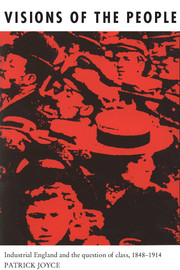Book contents
- Frontmatter
- Contents
- List of plates
- Acknowledgements
- 1 Introduction: beyond class?
- PART I POWER AND THE PEOPLE: POLITICS AND THE SOCIAL ORDER
- PART II MORALISING THE MARKET: WORK AND THE SOCIAL ORDER
- PART III CUSTOM, HISTORY, LANGUAGE: POPULAR CULTURE AND THE SOCIAL ORDER
- PART IV KINGDOMS OF THE MIND: THE IMAGINARY CONSTITUTION OF THE SOCIAL ORDER
- 9 Investigating popular art
- 10 The broadside ballad
- 11 The voice of the people? The character and development of dialect literature
- 12 Dialect and the making of social identity
- 13 Stages of class: popular theatre and the geography of belonging
- 14 Summary and conclusion: the making of the English working class before 1914?
- Appendices
- Bibliographical note
- Notes
- Index
10 - The broadside ballad
Published online by Cambridge University Press: 05 March 2012
- Frontmatter
- Contents
- List of plates
- Acknowledgements
- 1 Introduction: beyond class?
- PART I POWER AND THE PEOPLE: POLITICS AND THE SOCIAL ORDER
- PART II MORALISING THE MARKET: WORK AND THE SOCIAL ORDER
- PART III CUSTOM, HISTORY, LANGUAGE: POPULAR CULTURE AND THE SOCIAL ORDER
- PART IV KINGDOMS OF THE MIND: THE IMAGINARY CONSTITUTION OF THE SOCIAL ORDER
- 9 Investigating popular art
- 10 The broadside ballad
- 11 The voice of the people? The character and development of dialect literature
- 12 Dialect and the making of social identity
- 13 Stages of class: popular theatre and the geography of belonging
- 14 Summary and conclusion: the making of the English working class before 1914?
- Appendices
- Bibliographical note
- Notes
- Index
Summary
The popularity of the broadside ballad continued much later than is commonly allowed. Far from being a hostile environment the industrial town seems if anything to have been congenial to the ballad. The banning of street music in 1860s' London hastened the ballad's decline there, but in regions such as industrial Lancashire one many note a living practice in the street ballad singing of out-of-work operatives in the 1860s Cotton Famine. Men toured Lancashire and Yorkshire singing traditional songs as well as songs especially composed and printed for the occasion. In normal times, too, as late as the 1870s and 80s, the streets of Lancashire mill towns were reported to be full of street singers. In 1879 the citizens of Oldham got up a petition against the ‘profane and debauched’ singing of ballads in the street, especially on Sunday and by women as well as men. Ballads were published and sung to aid the victims of industrial accidents in mid-1880s’ Bradford. Party political agitation relied on the ballad form to the end of the century. The proponents of the Manchester Ship Canal, advocates of economic modernity in the 1880s and 90s, turned with alacrity to the oldestablished ballads in propagandising their case. The longevity, and something of the uses, of the ballad will be apparent.
- Type
- Chapter
- Information
- Visions of the PeopleIndustrial England and the Question of Class, c.1848–1914, pp. 230 - 255Publisher: Cambridge University PressPrint publication year: 1991



